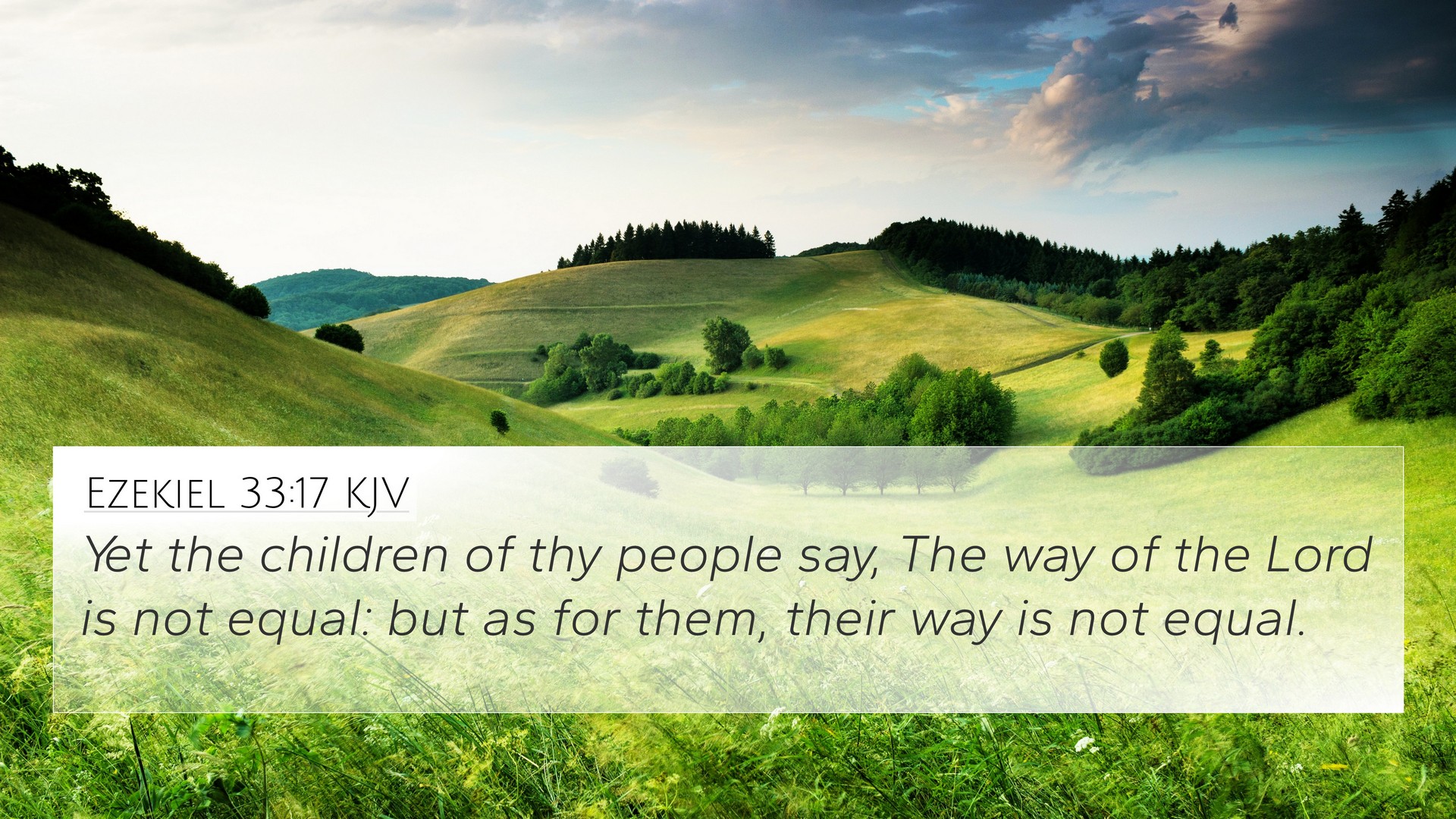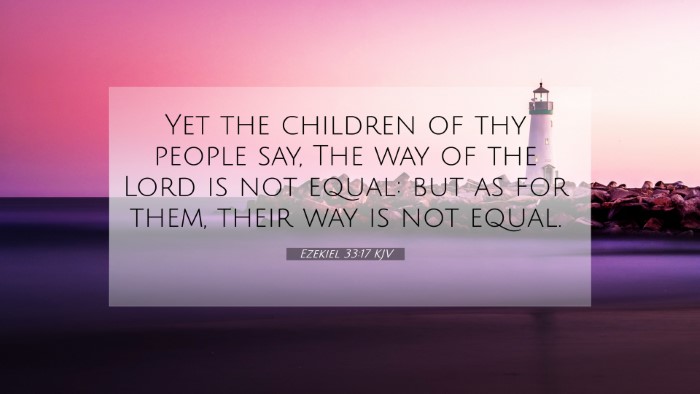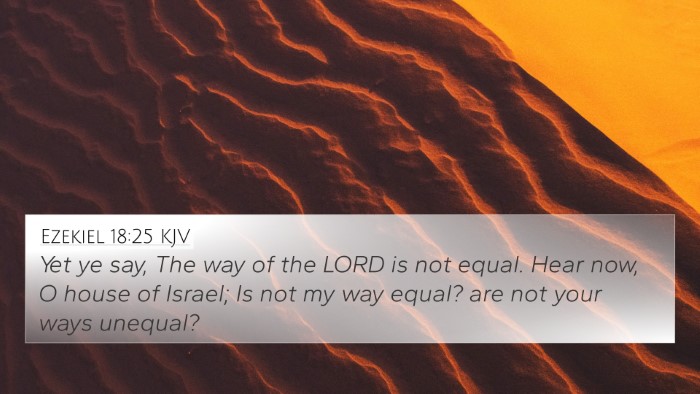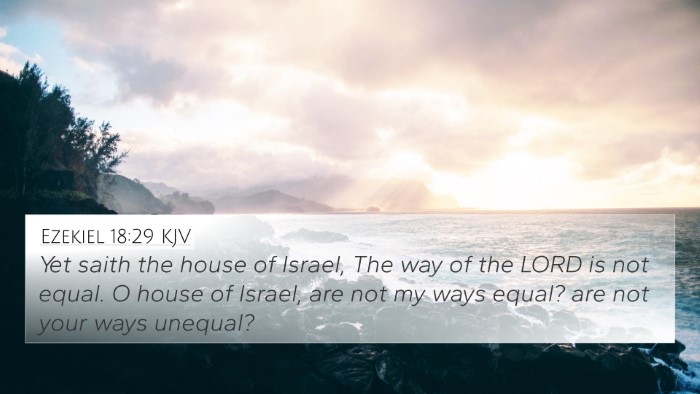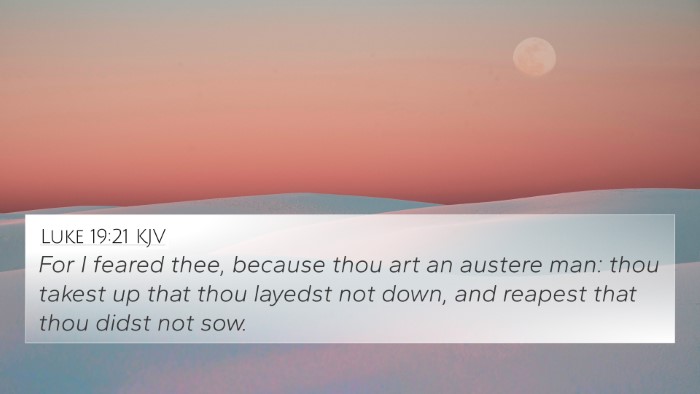Ezekiel 33:17 - Understanding the Verse
Ezekiel 33:17 states: “Yet the children of your people say, The way of the Lord is not equal: but as for them, their way is not equal.” This verse is a profound discourse reflecting the attitudes of the people regarding God's justice and their own moral conduct.
Summary of the Verse Meaning
The central theme of this verse revolves around the perception of divine fairness. The people of Israel criticize God’s ways, suggesting that His judgments are unfair, while they themselves fail to acknowledge their own inequities. This reflects a common human tendency to focus on perceived injustices while neglecting personal accountability.
Combined Insights from Commentaries
-
Matthew Henry's Commentary:
Henry emphasizes the hypocrisy exhibited by the Israelites, who complained of God's ways while ignoring their own transgressions. He highlights that this is a display of ingratitude and a failure to recognize God's patience and grace. The people assumed a victim mentality rather than reflecting on their moral responsibilities.
-
Albert Barnes' Notes:
Barnes notes that this verse illustrates a common criticism the people had towards God. He explains that they believed their struggles were due to God's perceived injustices, yet they were oblivious to their disobedience. They failed to see that their suffering was a consequence of their own actions.
-
Adam Clarke's Commentary:
Clarke discusses the nature of the complaints made by the Israelites. He points out that they were more concerned about their troubles rather than their sins. Clarke urges readers to examine their lives, reminding them that it is easy to blame God when we do not like the circumstances we face, instead of taking responsibility for our own moral failings.
Bible Verse Cross-References
Several Bible verses resonate with Ezekiel 33:17, offering deeper insights into the themes of divine justice and human accountability. Here are some related scriptures:
- Isaiah 5:20: "Woe to those who call evil good, and good evil..." - This verse addresses the distortion of moral judgment seen in the people of Israel.
- Romans 9:20: "But who are you, O man, to answer back to God?" - This illustrates the futility of questioning God's righteousness.
- Luke 18:11-12: "The Pharisee stood and prayed thus with himself, ‘God, I thank You that I am not like other men...'” - This reflects a similar attitude of self-righteousness.
- Jeremiah 12:1: "Righteous are You, O Lord, when I plead with You; yet let me talk with You about Your judgments..." - A direct parallel in questioning God's justice.
- 2 Peter 3:9: "The Lord is not slack concerning His promise, as some count slackness, but is long-suffering toward us..." - Title of God's patience in dealing with human sin.
- Matthew 7:4: “Or how can you say to your brother, ‘Let me remove the speck from your eye’; and look, a plank is in your own eye?” - Challenges hypocrisy in judgment.
- Psalms 73:3: "For I was envious of the boastful, when I saw the prosperity of the wicked." - Reflects the confusion regarding justice seen in human interpretation.
Thematic Connections and Comparative Analysis
This verse and its related cross-references provide a rich exploration of the themes of justice, human accountability, and the importance of self-examination in spiritual matters. The narrative invites believers to:
- Engage in thematic Bible verse connections, relating the messages of accountability found in both the Old and New Testaments.
- Utilize Bible reference resources to explore further the context and implications of seeking God’s justice.
- Develop a better understanding of similarities between prophetic warnings in the Old Testament and the messages of Christ in the Gospels.
- Employ tools for Bible cross-referencing when studying themes of justice, mercy, and accountability.
Conclusion
Ezekiel 33:17 serves as a critical reminder of the need for humility and self-awareness in the face of divine judgment. Recognizing our own flaws while grappling with our understanding of God’s fairness is essential in our spiritual journey. By cross-referencing and linking Bible scriptures, we deepen our comprehension of these themes and enhance our biblical literacy.
Further Study and Reflection
For those exploring the comparative Bible verse analysis, consider questions such as:
- How do these themes manifest in my life today?
- In what ways can I avoid the pitfalls of hypocrisy outlined in these scriptures?
- How do I reconcile my understanding of God's justice with my personal experiences of suffering?
